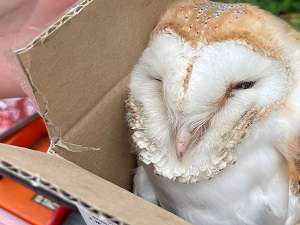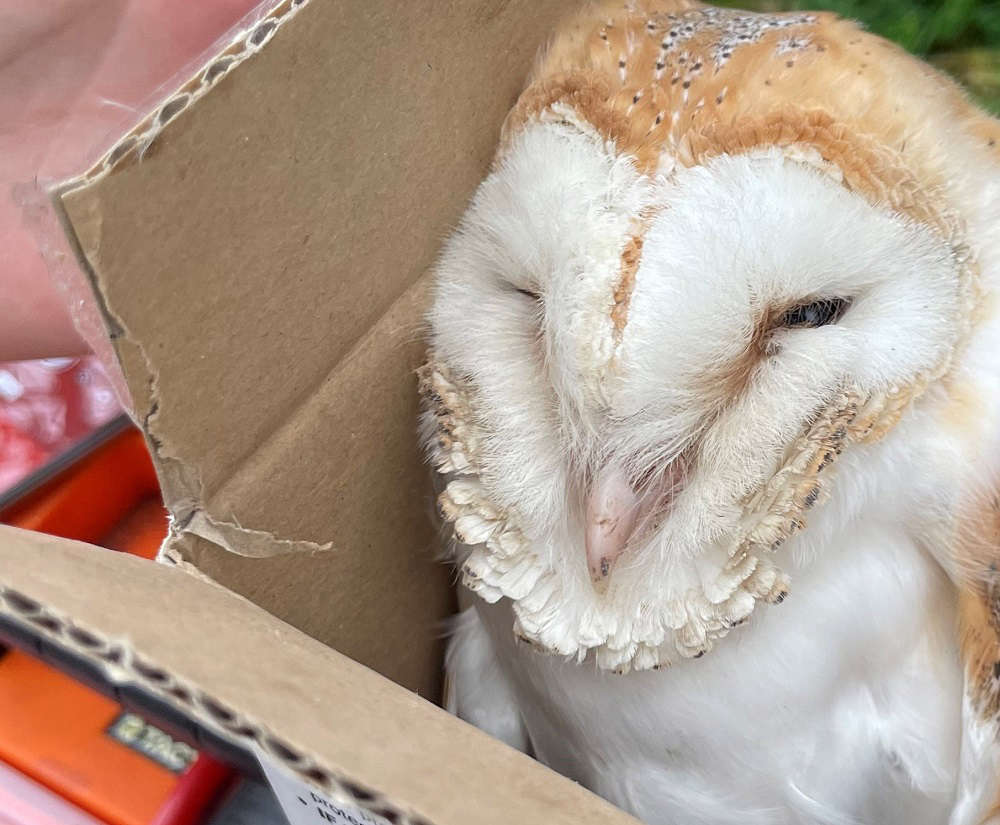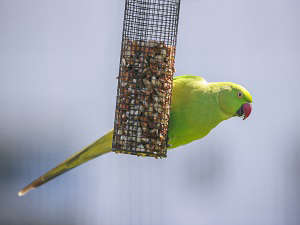
By Rebecca Black (PA)
The discovery of four chicks in November – one of the latest recorded in Northern Ireland to date – surprised and shocked conservationists from Ulster Wildlife, who inspected the nest site at Ballycruttle Farm under licence from Northern Ireland Environment Agency.
The chicks, which fledged in December, are one of the latest broods the local nature conservation charity has encountered in its work to protect these threatened farmland birds over the last 10 years.
In Northern Ireland, barn owl eggs are typically laid in April, with chicks normally fledging in June or July, occasionally later depending on the weather, but this brood has bucked the trend.
Katy Bell, senior conservation officer from Ulster Wildlife, said it is the second consecutive year barn owls have bred at Ballycruttle Farm.
“When Dawn, the landowner at Ballycruttle Farm, sent me an audio recording of chicks snoring and rasping in late October I couldn’t believe it, as it was so late in the season,” she said.
“A visit confirmed the exciting news, but our main concern was whether the chicks would survive given the extremely wet weather and floods. Barn owls struggle to hunt in wet conditions, but thankfully the odds were in their favour, as small mammals were fleeing to safety providing easy prey.
“On our return a few weeks later, we were ecstatic to ring four healthy chicks alongside BTO and RSPB NI. This is the second consecutive year barn owls have bred at Ballycruttle Farm – a real testament to their wildlife-rich habitats and practices.”
However, the Ballycruttle barn owl pair had their fair share of drama before raising their latest brood.
In March, jackdaws took up residence in their nest box, which resulted in the female moving away to a nearby farm, managed by the Kelly family. A single male had been hunting on the Kelly’s nature-friendly farm for many years and, to their delight, the pair bred and fledged one chick in late summer.
But the Ballycruttle male barn owl persisted; he kept calling and calling to woo the female back.
Eventually, she conceded and left her one chick in the hands of the male, who continued to keep feeding it, and laid another clutch of eggs in her original box at Ballycruttle Farm.
“It was like a soap opera with all the twists and nail-biting moments,” said Dawn Stocking, from Ballycruttle Farm.
“I was, of course, disappointed when the female jumped ship to my neighbour’s fantastic farm and thought that we weren’t going to see any chicks at Ballycruttle this year at all. So, you can imagine my utter excitement when I heard babies snoring from the nest box – it was like Christmas had come early!
“We set up a couple of wildlife cameras nearby to watch their antics, and what an experience it has been. We saw an adult dropping food and the scramble from the chicks. Wing stretches and small hops. We also heard the young calling to their parents and witnessed their first flights. It has been absolutely magical.”
Ballycruttle Farm and Kelly’s Farm are part of the County Down Farmland Bird Initiative, a group project within the Environmental Farming Scheme, led by RSPB NI.
RSPB NI has been working with both nature-friendly farms and Ulster Wildlife for many years to halt and reverse the decline of the barn owl, of which there are fewer than 30 breeding pairs estimated to be left in Northern Ireland.
Michelle Duggan, Conservation Officer at RSPB NI, added: “It is a delight to see the continued hard work carried out by both nature-friendly farms yield positive results for barn owls, as well as creating a network of habitats between the two sites.
“The valuable seed-rich habitats maintained on both farms are an essential winter food source for the endangered yellowhammer, and also ideal hunting territory for barn owls to catch small mammal prey.
“Healthy hedgerows combined with areas of rough grassland allow barn owls to expand their hunting territory even further.”
The chicks were ringed by licensed BTO bird ringers, David Galbraith and Stephen Fyffe, to help identify and track the birds’ movement. Strict hygiene procedures were followed to reduce possible transmission of Avian Influenza.
Ulster Wildlife has produced a guidance document for those who have land suitable for barn owls
The charity has urged those who spot a barn owl or would like to discuss measures you can put in place to help them, to contact Katy Bell at Ulster Wildlife on 07816 065 736 or email barnowls@ulsterwildlife.org



 Legal papers lodged in challenge to Irish language signs at Belfast station
Legal papers lodged in challenge to Irish language signs at Belfast station
 Bikers to descend on Westminster for veterans protest against Legacy Act repeal
Bikers to descend on Westminster for veterans protest against Legacy Act repeal
 Guidance sought over future of colourful parakeets in Belfast park
Guidance sought over future of colourful parakeets in Belfast park
 Woman released after questioning over pipe bombs in Co Down
Woman released after questioning over pipe bombs in Co Down
 Suspended chief constable will not be prosecuted over alleged sexual offences
Suspended chief constable will not be prosecuted over alleged sexual offences